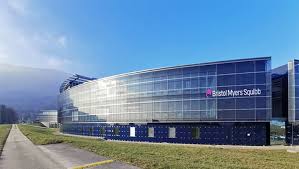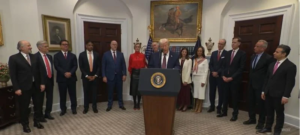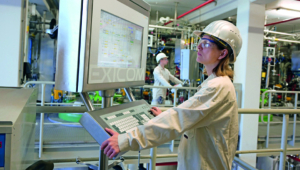
Super deal for BioNTech – BMS licenses potential blockbuster for €10bn
In the race to replace MSD's mega blockbuster pembrolizumab with a more effective bispecific VEGF x PD-(L)1 antibody, German company BioNTech SE has struck a good deal. BioNTech is now developing its Phase III programme BNT327, acquired with the US$950m takeover of Chinese company Biotheus Co Ltd, with Bristol Myers Squibb (BMS) in return for a payment of US$11.1bn.
The deal, announced just in time for the world’s largest cancer meeting, ASCO, shows the struggle among pharmaceutical giants to find a successor to MSD’s immuno-oncology blockbuster pembrolizumab, which generated sales of US$15bn in 2024. The first market approval in the US could go to the bispecific VEGFxPD1 antibody ivonescimab from Chinese company Akeso, licensed by Summit Therapeutics for US$500m upfront. The therapy, which is already approved in China, achieved a statistical prolongation of progression-free survival (PFS) but not of overall survival (OS), which caused Summit’s share price to fall by 37% at the end of April.
Hopes are therefore pinned on the Phase III followers. Pfizer Inc, which acquired the VEGF x PD1 candidate SSGJ-707 together with Chinese developer 3S Bio for US$1.25bn at the end of May, reported an objective response rate of 65% and 77% at the highest dose of 10 mg/kg for low and high PD-1 expression, respectively (Ivonecimab 50%) at ASCO. MSD’s VEGF x PD1 antibody LM-299, licensed from LaNova Medicines, also based in China, is still in early clinical testing. BioNTech’s Phase III VEGF A x PD-L1 antibody BNT327, on the other hand, is in Phase III testing, with only preclinical data reported at ASCO.
The collaboration with BMS for joint development and marketing with a 50/50 profit-loss split aims to accelerate the potential approval of BNT327, according to the announcement of the collaboration. Unlike Summit and Pfizer, the aim is not to seek approval in non-small cell lung cancer (NSCLC) first, but in numerous solid tumour types.
In addition to a registration study as first-line treatment for NSCLC, a global Phase III study in triple-negative breast cancer (TNBC) will start by the end of 2025. Combination therapies will also be evaluated.
According to the agreement, BMS will make an upfront payment of US$1.5bn to BioNTech and a total of US$2bn in ‘anniversary payments’ through 2028. These tax-deductible expenses will be recorded as acquired IPR&D expenses when incurred, with the US$1.5bn accruing in the second quarter. In addition, BioNTech is entitled to up to US$7.6bn for additional milestones in development, approval and marketing. Global profits/losses are to be split equally between BioNTech and BMS.


 White House
White House Merck KGaA, Darmstadt Germany
Merck KGaA, Darmstadt Germany Rosa Therapeutics Inc
Rosa Therapeutics Inc